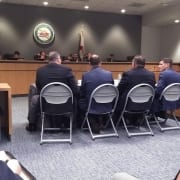Congressional Subcommittee Holds Hearing on Helping Homeless Veterans
By Larry Jasper
The U.S. House of Representatives Veterans Affairs Subcommittee on Economic Opportunities held a field hearing in New Port Richey, Florida, on September 16. The hearing on combating homelessness in the Tampa Bay area focused on the best practices utilized throughout Tampa Bay and identifying gaps where more targeted intervention is needed.
The panel consisted of Chairman Mike Levin, D-CA, Ranking Member Gus Bilirakis, R-FL, and Rep. Vincent Spano, R-FL. The committee’s ten other members were not present.
Those who were called to testify included Joe Battle, Director of the James A. Haley VA Hospital in Tampa, Danny Burgess, Executive Director of the Florida Department of Veterans Affairs, David Lambert, Chairman of the Pasco County, Florida Housing Authority, Michael Raposa, CEO of St. Vincent DePaul CARES, Brian Anderson, Founder and CEO of Veterans Alternative, and Mary White, a former homeless veteran and single parent.
White spoke courageously about her life as a homeless veteran and single parent to an infant. She outlined the long process of getting aid, her difficulties with affordable childcare, and a lack of public transportation. After several years of taking advantage of support available to homeless veterans, White is now finishing her master’s degree and is on her way to supporting herself.
Some of the key points made during the hearing:
-
- A non-veteran can get temporary housing for all members of their family, but the VA will pay for temporary housing only for the veteran, not his or her family.
- The Housing and Urban Development Veterans Affairs Supportive Housing (HUD-VASH) program, which combines Housing Choice Voucher rental assistance for homeless veterans with case management and clinical services provided by the VA has helped reduce the homeless veteran population in the Tampa Bay area by about 70%. Since 2011, homelessness among veterans in Florida has been cut in half.
- There is no federal standard or method for accurately counting homeless veterans.
- To get a veteran into housing under the HUD-VASH program takes approximately three months. In most areas, there is no temporary housing available while a homeless veteran waits for approval.
- In many areas apartment owners will not rent to someone using HUD-VASH vouchers because the program does not keep up with fluctuating housing prices. Also, HUD-VASH does not provide for move-in costs.
- There are no transitional programs for incarcerated veterans.
- St. Vincent DePaul CARES has tried to purchase housing for homeless veterans but no bank is willing to provide loans, even though HUD-VASH vouchers will cover the payments. The organization asked the subcommittee to work out a loan guarantee for such housing, similar to the VA home loan guarantees.
The subcommittee also discussed the June 6, 2019 launch of the new Veterans Community Care Program. This will strengthen the nationwide VA Health Care System by empowering veterans with more health care options.
After the formal hearing I had an opportunity to speak with both Bilirakis and his Outreach Director, Rob Fleege, about what my post, the Department of Florida, and JWV as a whole, can do to help with the issue of homeless veterans.
I feel this hearing was an excellent example of bipartisan cooperation for the benefit of veterans, especially homeless veterans. It is apparent that the lawmakers hold veterans in high esteem and are genuinely interested in honoring veterans in any way possible.
Volume 73. Number 3. 2019




